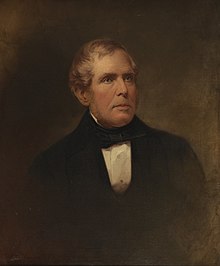Joseph Reed Ingersoll
This article needs additional citations for verification. (April 2013) |
Joseph Reed Ingersoll | |
|---|---|
 | |
| United States Minister to Great Britain | |
| In office August 21, 1852 – August 23, 1853 | |
| President | Millard Fillmore |
| Preceded by | Abbott Lawrence |
| Succeeded by | James Buchanan |
| Chair of the House Judiciary Committee | |
| In office March 4, 1847 – March 4, 1849 | |
| Preceded by | George O. Rathbun |
| Succeeded by | James Thompson |
| Member of the U.S. House of Representatives from Pennsylvania's 2nd district | |
| In office October 12, 1841 – March 4, 1849 | |
| Preceded by | John Sergeant |
| Succeeded by | Joseph R. Chandler |
| In office March 4, 1835 – March 4, 1837 Serving with James Harper | |
| Preceded by | Horace Binney |
| Succeeded by | John Sergeant |
| Personal details | |
| Born | Joseph Reed Ingersoll June 14, 1786 Philadelphia, Pennsylvania |
| Died | February 20, 1868 (aged 81) Philadelphia, Pennsylvania |
| Political party | Whig |
| Spouse |
Ann Wilcocks (m. 1813) |
| Parent(s) | Jared Ingersoll Elizabeth Pettit |
| Education | Princeton College |
| Signature | |
Joseph Reed Ingersoll (June 14, 1786 – February 20, 1868) was an American lawyer and statesman from Philadelphia, Pennsylvania. In 1835 he followed his father, Jared Ingersoll, and his older brother, Charles Jared Ingersoll, to represent Pennsylvania in the U.S. House.
Biography
[edit]He graduated from Princeton College in 1804. He studied law with his father, was admitted to the bar and commenced practice in Philadelphia. In 1825, Ingersoll was elected to the American Philosophical Society.[1]
He was elected in 1834 as a Whig anti-Jacksonian candidate to the Twenty-fourth Congress. He declined to be a candidate for renomination in 1836, serving 1835–1837. He resumed the practice of law.
Ingersoll was elected as a Whig to the Twenty-seventh Congress to fill the vacancy caused by the resignation of John Sergeant. He was reelected as a Whig to the Twenty-eighth, Twenty-ninth, and Thirtieth Congresses. He declined to accept the nomination as a candidate for reelection in 1848. In all, his second stay in office lasted from 1841 to 1849.
He was the chairman of the United States House Committee on the Judiciary during the Thirtieth Congress. He was an advocate for protection and a firm supporter of Henry Clay. One of his noted efforts in the House was a defense of Clay's tariff of 1842.
In 1852, President Millard Fillmore sent him to the United Kingdom as the U.S. Minister. He served about a year, and then retired to private life, devoting himself to literary pursuits. The degree of LL.D. was conferred on him by Lafayette and Bowdoin in 1836, and that of D.C.L. by Oxford in 1845.
He died in Philadelphia in 1868. Interment in St. Peter's Protestant Episcopal Churchyard.
Works
[edit]He was a warm adherent of the Union, and at the time of the American Civil War prepared an essay entitled "Secession, a Folly and a Crime." He published a translation from the Latin of Roceus's (Francesco Rocco's) tracts "De Navibus et Naulo" and "De Assecuratione" (Philadelphia, 1809), and was the author of a Memoir of Samuel Breck (1863).
Notes
[edit]- ^ "APS Member History". search.amphilsoc.org. Retrieved April 6, 2021.
Sources
[edit]- United States Congress. "Joseph Reed Ingersoll (id: I000019)". Biographical Directory of the United States Congress.
- The Political Graveyard
Attribution
- This article incorporates text from a publication now in the public domain: Wilson, J. G.; Fiske, J., eds. (1892). . Appletons' Cyclopædia of American Biography. New York: D. Appleton.
- 1786 births
- 1868 deaths
- Politicians from Philadelphia
- Ingersoll family
- American people of English descent
- Pennsylvania National Republicans
- National Republican Party members of the United States House of Representatives
- Whig Party members of the United States House of Representatives from Pennsylvania
- 19th-century people from Pennsylvania
- Ambassadors of the United States to the United Kingdom
- 19th-century American diplomats
- Princeton University alumni
- 19th-century American legislators
- Lawyers from Philadelphia
- Burials at St. Peter's churchyard, Philadelphia
- 19th-century American lawyers
- 19th-century American Episcopalians

